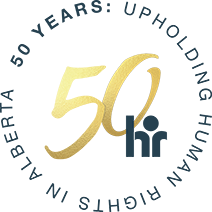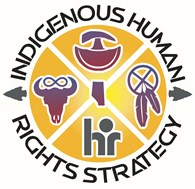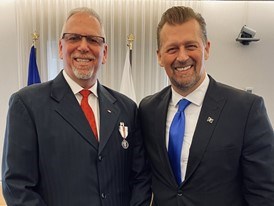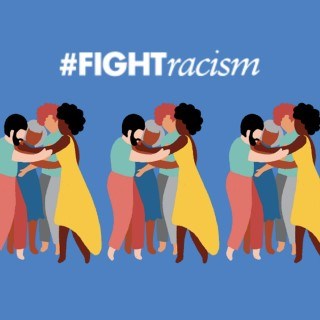1. The Commission mourns the loss of local human rights educator and friend
Hilda Andresen, human rights champion, educator, colleague, and friend, passed away on February 2, 2023.
From 2016-2022, Hilda facilitated human rights workshops for the Alberta Human Rights Commission, explaining the connections between human rights legislation and its application to workplaces across Alberta. With a practical and direct style, she explained the nuances of human rights law to many provincial organizations and local businesses, as well as to countless individuals. In the truest sense of these words, she was a trusted guide and educator to anyone seeking information about human rights, equality, diversity, and inclusion.
The Commission will greatly miss Hilda's enthusiasm for helping individuals and organizations better understand human rights principles and create workplaces free from discrimination, where everyone is respected and included. We will remember Hilda for her selflessness, dedication, and persistence in promoting and defending the human rights of Albertans.
As Hilda said, "It's important to be who you are - but as part of one people."
To learn more, read Hilda's obituary.
2. 2021-22 Annual Report is now available
Tabled on December 12, 2022, the Commission's 2021-22 Annual Report is now available for viewing.
3. External Review completed
As part of the Alberta Human Rights Commission's Indigenous Human Rights Strategy, we conducted an organization-wide external review to identify areas in which the Commission may be unknowingly perpetuating systemic discrimination against Indigenous Peoples through our programs, procedures, and operations. This review was conducted by an independent, Indigenous-led third party. The reviewer used an in-depth approach to develop an understanding of the systemic issues that may exist within the Commission and practices that may have negative impacts on Indigenous Peoples.
The report highlights that Indigenous individuals do not access the Commission's programs and services due to a lack of awareness of the Commission, accessibility challenges, cumbersome processes, language barriers, and fear of being re-victimized or re-traumatized, and makes recommendations for improving our programs and services.
Implementing the recommendations from the report will improve outcomes for Indigenous Peoples when accessing the human rights system, as well as for other marginalized or disadvantaged groups who potentially experience similar barriers in accessing our programs and services. This report can additionally serve as a guide for other groups who are seeking to address systemic discrimination within their organizations and take meaningful actions to support Indigenous people in Alberta and beyond.
With support from the Indigenous Advisory Circle, we have begun reviewing and implementing a number of the report's recommendations, in particular:
- making the complaint process easier to navigate,
- engaging with organizations that support Indigenous people with navigating the human rights system, including educating community navigators about the Commission's complaint process,
- making our systems more culturally relevant,
- improving our communications by finding new ways to better reach Indigenous people and communities,
- enhancing staff training, and
- expanding our reach to new Indigenous groups, organizations, and communities.
We will continue to work with the Circle on implementing these recommendations.
4. Revised human rights guide
The Commission is pleased to share the recent publication of the human rights guide, Human rights, pregnancy, and parental rights and responsibilities (formerly, "Rights and responsibilities related to pregnancy, childbirth and adoption"). This newly revised version reflects the 2015 and 2018 amendments to the Alberta Human Rights Act, current case law (including many new relevant Alberta cases), and Commission policies and guidelines at the time of updating.
This guide explains the provisions of the Act as they apply to pregnancy, breastfeeding, maternity and parental leave, adoption, and childcare obligations. It also provides resources for finding more information about maternity leave and parental leave, which includes leave for adoptive parents.
Stay tuned for more information on an upcoming webinar on the guide.
5. Connect with us on LinkedIn!

In an effort to connect Albertans and other key stakeholders, the Commission has launched a LinkedIn account. In doing so, we aim to better reach a variety of audiences, including service providers, employees and employers, human resources professionals, industry associations, advocates, academics, small- and medium-sized businesses, unions, and the labour and employment sector more broadly.
In the months ahead, we hope to further expand our social media presence, increasing our reach to other community stakeholders.
Be sure to follow the Commission on LinkedIn for regular updates about human rights in the workplace and beyond. You are welcome to engage with our posts by sharing, liking, and commenting
6. Alberta 50 for 50 Campaign

The Commission has officially launched the #AB50for50 campaign, an initiative encouraging all Albertans to spend a minimum of 50 minutes in 2023 expanding their knowledge and understanding of human rights. To help Albertans figure out where to begin, we have put together a campaign webpage with a comprehensive list of human rights resources, including engaging videos, reports, webinars, books, events, and more. This list will make it easy for Albertans of all ages to find and participate in #AB50for50 campaign activities.
The Commission developed its 50 for 50 campaign based on consultation with community organizations across Alberta's vast human rights sector. Together with our stakeholders, we hope to inspire Albertans to take action towards creating a culture of human rights.
Participate in the campaign in a number of ways, including:
- Reading a book
- Watching a documentary or film
- Volunteering at a local organization that promotes human rights causes
- Attending a conference or webinar
- Hosting a fundraiser for a human rights cause
- Listening to a podcast
- Taking a course
- Hosting a human rights event at your school
- Reading a report
- Listening to a TED Talk or lecture
- Attending a human rights workshop
- Learning about the work of a human rights organization
- Speaking with family and friends
As you take part in 50 for 50 initiatives throughout 2023, please be sure to let us know by using the hashtag #AB50for50 on social media. You can also tag friends, family, and colleagues to challenge them to join you in the campaign.
7. Indigenous art contest results

In 2022, the Commission invited designs for a graphic image, which embodied the Indigenous Human Rights Strategy and represented our commitment to working with Indigenous people in addressing discrimination in Alberta.
Derek Fisher, an Edmonton-based Cree and Saulteaux graphic designer and illustrator, submitted the winning design. He describes the artwork as representing "the circle of life and within are the four directions and the iconic symbolism of Alberta's rich and diverse Indigenous Peoples and communities. They are coming together with the province. The arrowheads indicate the commonality the groups share, sunrise to sunset." Derek further incorporated our logo "to signify partnership and give legitimacy to the Commission's efforts.
Vennessa Cheran Plotnikoff, from Waterhen Lake First Nation, submitted the runner-up design. The artwork depicts two feathers in the colours of the medicine wheel, representing the four directions and the importance of harmony and balance.
8. Upcoming Human Rights in the Workplace public workshops
The Commission offers online Human Rights in the Workplace public workshops that provide participants with basic human rights information, including information about Alberta's human rights legislation, concepts like the duty to accommodate, and strategies for preventing harassment in the workplace.
Registration is currently open and available for the following workshop date:
June 6 - 7, 2023
Learn more about our public workshops, the upcoming schedule, and registration details.
9. The Commission and the community
- In recognition of Truth and Reconciliation Day, Commission staff participated in customized, on the land Indigenous training with Elder Doreen Spence on October 6, 2022. It was an immersive experience that provided in-depth learning about traditional native teachings and Indigenous culture and spirituality, and how to apply those teachings to the Commission's work.
- On February 13, 2023, the Government of Alberta awarded Cam Stewart, Policy & Program Consultant with the Alberta Human Rights Commission, the Queen Elizabeth II's Platinum Jubilee Medal for his outstanding contributions serving Alberta, his community, and the Ministry of Justice. In 2022, the Queen Elizabeth II's Platinum Jubilee Medal (Alberta) was created to mark the 70th anniversary of Her Majesty's Accession to the Throne as Queen of Canada. As such, this is a one-time program to recognize recipient commitments and contributions during the Queen's Platinum Jubilee year.

- On February 17, 2023, as part of February's Black History Month, Commission staff attended a learning session hosted by Cynthia Okafor on "How to be Anti-Racist." Ms. Okafor is a renowned expert in anti-racism, diversity, equity, and inclusion. The session covered topics such as the history and manifestation of racism in the Canadian and Alberta context, impact of racism, and allyship and the performative pitfalls. Attendees undertook a self-reflection activity to determine where they are on their journey to becoming anti-racist.
- Throughout February and March, as part of the Commission's efforts to improve accessibility.
- Deaf and Hear Alberta hosted a workshop on advancing equity, diversity, and inclusion for deaf and hard-of-hearing individuals. Participants reflected on unconscious biases, learned about Deaf and hard-of-hearing perspectives and the responsibilities employers and business owners have to their teams and consumers, and identified ways to implement communication access for employees and clientele.
- Public Library Services (Alberta Municipal Affairs) led a series of internal workshops on creating accessible files using a variety of Microsoft Office Suite tools. Staff learned how to incorporate accessibility features into their files, focusing especially on formatting features so that their files do not rely solely on visual cues.





 On January 6, 2023, the City of Edmonton (in partnership with the Anti-Defamation League) launched
On January 6, 2023, the City of Edmonton (in partnership with the Anti-Defamation League) launched 